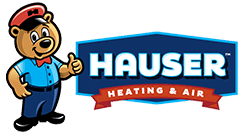When your AC unit starts leaking water, it should be a cause for concern. Not only can a leaking air conditioning unit be a sign of a system problem, but it can also lead to costly damage to your home if not promptly addressed.
If your AC is leaking water, don’t ignore it! While it is never a bad idea to contact an AC repair expert in these situations, if you are a ‘do-it-yourself’ type of homeowner, you can try to investigate the problem on your own. Sometimes AC water leaks can be addressed without a service call. Always exercise extreme caution, however, so as to ensure your own safety and avoid causing further damage to the AC unit.
Common Reasons Why an AC is Leaking Water
Before trying to figure out why your AC is leaking water, let’s consider some common causes for air conditioning system leaks:
Clogged Drain Line – Oftentimes an AC unit leaks water because it has a clogged drain line. Dirt, dust, and algae can accumulate in the drain line, causing a blockage that prevents the condensate from draining properly.
Frozen Evaporator Coil – When the AC evaporator coil becomes frozen due to restricted airflow or low refrigerant levels, it can eventually thaw and lead to excess water dripping from the unit.
Improper Installation – Poorly installed AC units may not be properly leveled, leading to uneven condensate drainage and leaks.
Dirty Air Filter – A dirty air filter can restrict airflow, causing the evaporator coil to freeze and subsequently drip water.
Refrigerant Leaks – Low refrigerant levels can result in temperature fluctuations and excessive condensation, leading to water leaks.
Cracked or Damaged Drain Pan – The drain pan underneath the evaporator coil can become cracked or damaged over time, causing water to leak out.
What to Do When Your AC is Leaking Water
Before investigating why your AC is leaking water, turn the system off. This will prevent further damage and potential electrical dangers. Also, check for electrical hazards, such as exposed wires or sockets near the leaking area. Keep in mind, also: by doing some of this work yourself, you could be voiding a manufacturer’s warranty. If you’re unsure about anything, it’s best to contact a professional technician.
Before you begin your inspection, you will also need to safely remove any water that has collected around the AC unit. You can use towels, a wet-dry vacuum, or a mop to do this. Once the area is prepared, follow these investigative steps:
1. Inspect the Drain Line
Check the drain line for clogs. If you find a blockage, you can attempt to clear it by using a wet-dry vacuum or a long, flexible brush. Be cautious not to damage the drain line.
2. Change the Air Filter
If your air filter is dirty or clogged, replace it with a new one to ensure proper airflow.
3. Wait for the AC to Thaw
If the evaporator coil is frozen and near the water you’ve noticed, let the unit thaw completely before turning it back on. This may take several hours.
4. Monitor the System
After addressing the issue, turn the AC back on and monitor it closely. If the problem persists, or if you suspect a refrigerant leak or a damaged drain pan, it’s best to contact a professional HVAC technician for further diagnosis and repair.
Prevent Future AC Leaks with Proper Maintenance
Avoid problems with your AC leaking water in the future by following these tips:
- Keep the area around your AC unit clean and free from debris to promote proper airflow.
- Change your air filters regularly, as recommended by the manufacturer or HVAC technician.
- Ask your Hauser technician about a condensate pump to help with proper drainage, especially if your AC unit is located in a basement or crawlspace.
- Consider investing in a Hauser Air Pro service plan, which includes maintenance checks to ensure that your system is in good working order.
Regular maintenance and prompt action when leaks occur can help keep your AC system running efficiently and prevent costly damage to your home. While some minor leaks can be addressed by homeowners, if your AC is leaking water consistently, the issue may be more complex and best left to a professional HVAC technician. The Hauser Air team is here to serve your air conditioning system needs in the Greater Cincinnati area. Contact us to request an appointment.




 Due to recent snowfall and more expected, we wanted to pass along a few tips for our customers who own heat pump systems.
Due to recent snowfall and more expected, we wanted to pass along a few tips for our customers who own heat pump systems.
